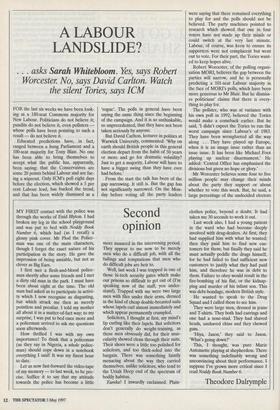Second opinion
MY FIRST contact with the police was through the works of Enid Blyton. I had broken my leg in the school playground and was put to bed with Noddy Book Number 6, which had (as I recall) a glossy pink cover. Mr Plod the Police- man was one of the main characters, though I forget the exact nature of his participation in the story. He gave the impression of being amiable, but not as clever as Big Ears.
I first met a flesh-and-blood police- man shortly after some friends and I met a dirty old man in the park. I must have been about eight at the time. The old man had asked us to participate in activi- ty which I now recognise as disgusting, but which struck me then as merely pointless and peculiar. I told my mother all about it in a matter-of-fact way; to my surprise, I was put to bed once more and a policeman arrived to ask me questions soon afterwards.
How thrilled I was with my own importance! To think that a policeman (as they say in Nigeria, a whole police- man) should copy down in a notebook everything I said! It was my finest hour to date.
Let us now fast-forward the video-tape of my memory — to last week, to be pre- cise. Suffice it to say that my attitude towards the police has become a little more nuanced in the intervening period. They appear to me now to be merely men who do a difficult job, with all the failings and temptations that men who do difficult jobs are heir to.
Well, last week I was trapped in one of those hi-tech security gates which make our prisons so difficult to get out of (I'm speaking now of the staff, you under- stand). Trapped with me were two large men with files under their arms, dressed in the kind of cheap double-breasted suits whose lapels curl almost immediately and which appear permanently crumpled.
Solicitors, I thought at first, my mind's lip curling like their lapels. But solicitors don't generally do weight-training, as these men obviously did, for their mus- cularity showed clean through their suits. Their shoes were a little too polished for solicitors, and too thick-soled into the bargain. There was something faintly menacing about the way they carried themselves, unlike solicitors, who tend to the Uriah Heep end of the spectrum of bodily habitus.
Eureka! I inwardly exclaimed. Plain- clothes police, beyond a doubt. It had taken me 30 seconds to work it out.
Last week also, I had a young patient in the ward who had become deeply involved with drug-dealers. At first, they had supplied him with what he wanted; then they paid him to fmd new cus- tomers for them; but finally they said he must actually peddle the drugs himself, for he had failed to find sufficient new customers to justify what they had paid him, and therefore he was in debt to them. Failure to obey would result in the fire-bombing of his flat, or the kidnap- ping and murder of his infant son. This was debt-bondage, modem British style.
He wanted to speak to the Drug Squad and I called them to see him.
They were large men, dressed in jeans and T-shirts. They both had earrings and one had a nose-stud. They had shaved heads, unshaved chins and they chewed gum- `Hiya, Jason,' they said to Jason. `What's going down?'
This, I thought, was pure Marie Antoinette playing at shepherdess. There was something indefinably wrong and unconvincing about their performance. I suppose I've grown more critical since I read Noddy Book Number 6.
Theodore Dalrymple


































































 Previous page
Previous page